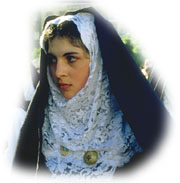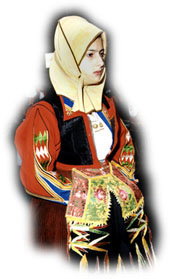Apart from these exceptions, the
traditional costumes are proudly worn by both old and young only on special occasions, such
as the village festival. Every town, village and city has its own festival which is generally a
festival in honour of the Patron Saint. It is impossible to list them all. These festivals occur
mainly in the summer and are connected with the harvest. In a poor society like Sardinia which lived on
sheep-breeding and agriculture, the long awaited moment to celebrate was when the land
finally yielded its bounty, offering everybody a plentiful supply of food for at least a few days.
|
|
 |
 |
|
September was the
other period of the year when festivals were celebrated. This was the
month that started the agricultural year and the farmers and farmer workers hoped for good
crops that would bring them prosperity. In the countryside propitiatory rites were
celebrated. The people celebrated the beginning of the new working year and invoked God's
help and protection in order that God would bestow sun and water, the two essential
requirements for agriculture, on their fields. Many of these rites are still
celebrated, especially in small towns and villages, and for the festival of the Patron Saint.
On this day, many people wear their traditional costume to go to church, to walk in religious
processions or to meet together in the town or village square to brighten up the dances.
|
|

